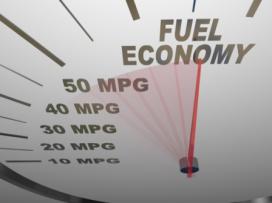Increasing the Fuel Economy of Vehicle Fleets
Volpe offers critical support and analysis to help the National Highway Traffic Safety Administration (NHTSA) develop standards to regulate and increase the average fuel economy of cars and trucks sold in the United States. The goal is to decrease U.S. energy consumption and the negative effect of fossil fuels on the environment.
The Challenge
To reduce U.S. energy consumption, NHTSA needed to understand the full picture of fuel savings, emissions, manufacturers’ compliance costs, and consumer benefits in order to develop the Corporate Average Fuel Economy (CAFE) standards. A model that could calculate all of these impacts was necessary to determine the possible benefits of future rulemakings and to set future standards at their maximum feasible levels.
The Solution
With our understanding of industry processes and government regulations, Volpe analysts developed the CAFE Compliance and Effects Modeling System (also referred to as the “Volpe Model”) to calculate the costs and benefits of CAFE standards for the consumer and the environment. NHTSA utilizes this model to estimate how much it would cost for manufacturers to comply with CAFE standards. The model can also be used to determine other costs, such as costs to the consumer, manufacturers’ compliance costs, and emissions costs.
The Impact
Fuel economy increases achieved under DOT’s CAFE standards saved the nation about 60 billion gallons of fuel in 2012. Using Volpe’s analytical support and modeling tools, NHTSA recently completed major rulemakings to establish new CAFE standards for light trucks and passenger cars for model years 2012-2016 and 2017-2021.
These efforts reduce fossil fuel consumption and emissions and increase efficiency standards of passenger vehicles, saving consumers money and reducing greenhouse gas emissions. DOT’s CAFE standards have achieved more to reduce greenhouse gas emissions than any other U.S. regulatory program to date.

Sponsor
National Highway Traffic Safety Administration
